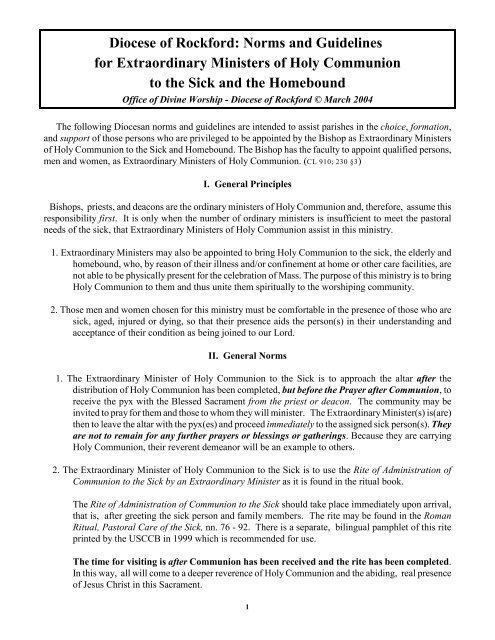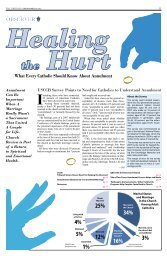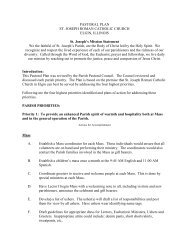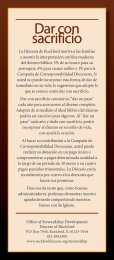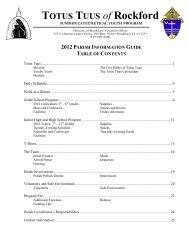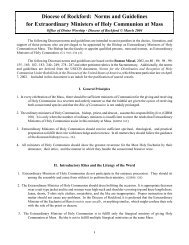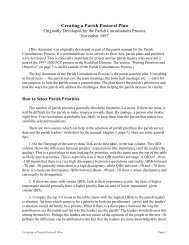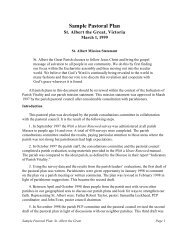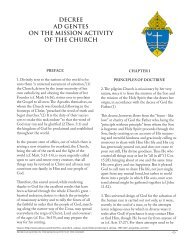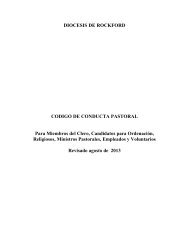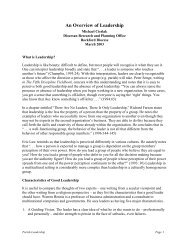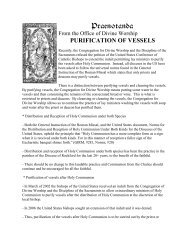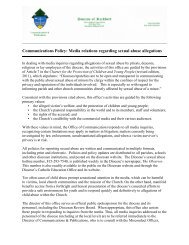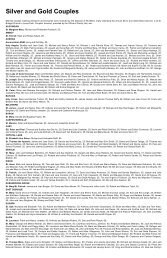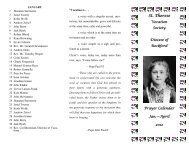Extraordinary Ministers of Holy Communion to the Sick - Diocese of ...
Extraordinary Ministers of Holy Communion to the Sick - Diocese of ...
Extraordinary Ministers of Holy Communion to the Sick - Diocese of ...
Create successful ePaper yourself
Turn your PDF publications into a flip-book with our unique Google optimized e-Paper software.
<strong>Diocese</strong> <strong>of</strong> Rockford: Norms and Guidelines<br />
for <strong>Extraordinary</strong> <strong>Ministers</strong> <strong>of</strong> <strong>Holy</strong> <strong>Communion</strong><br />
<strong>to</strong> <strong>the</strong> <strong>Sick</strong> and <strong>the</strong> Homebound<br />
Office <strong>of</strong> Divine Worship - <strong>Diocese</strong> <strong>of</strong> Rockford © March 2004<br />
The following Diocesan norms and guidelines are intended <strong>to</strong> assist parishes in <strong>the</strong> choice, formation,<br />
and support <strong>of</strong> those persons who are privileged <strong>to</strong> be appointed by <strong>the</strong> Bishop as <strong>Extraordinary</strong> <strong>Ministers</strong><br />
<strong>of</strong> <strong>Holy</strong> <strong>Communion</strong> <strong>to</strong> <strong>the</strong> <strong>Sick</strong> and Homebound. The Bishop has <strong>the</strong> faculty <strong>to</strong> appoint qualified persons,<br />
men and women, as <strong>Extraordinary</strong> <strong>Ministers</strong> <strong>of</strong> <strong>Holy</strong> <strong>Communion</strong>. (CL 910; 230 §3)<br />
I. General Principles<br />
Bishops, priests, and deacons are <strong>the</strong> ordinary ministers <strong>of</strong> <strong>Holy</strong> <strong>Communion</strong> and, <strong>the</strong>refore, assume this<br />
responsibility first. It is only when <strong>the</strong> number <strong>of</strong> ordinary ministers is insufficient <strong>to</strong> meet <strong>the</strong> pas<strong>to</strong>ral<br />
needs <strong>of</strong> <strong>the</strong> sick, that <strong>Extraordinary</strong> <strong>Ministers</strong> <strong>of</strong> <strong>Holy</strong> <strong>Communion</strong> assist in this ministry.<br />
1. <strong>Extraordinary</strong> <strong>Ministers</strong> may also be appointed <strong>to</strong> bring <strong>Holy</strong> <strong>Communion</strong> <strong>to</strong> <strong>the</strong> sick, <strong>the</strong> elderly and<br />
homebound, who, by reason <strong>of</strong> <strong>the</strong>ir illness and/or confinement at home or o<strong>the</strong>r care facilities, are<br />
not able <strong>to</strong> be physically present for <strong>the</strong> celebration <strong>of</strong> Mass. The purpose <strong>of</strong> this ministry is <strong>to</strong> bring<br />
<strong>Holy</strong> <strong>Communion</strong> <strong>to</strong> <strong>the</strong>m and thus unite <strong>the</strong>m spiritually <strong>to</strong> <strong>the</strong> worshiping community.<br />
2. Those men and women chosen for this ministry must be comfortable in <strong>the</strong> presence <strong>of</strong> those who are<br />
sick, aged, injured or dying, so that <strong>the</strong>ir presence aids <strong>the</strong> person(s) in <strong>the</strong>ir understanding and<br />
acceptance <strong>of</strong> <strong>the</strong>ir condition as being joined <strong>to</strong> our Lord.<br />
II. General Norms<br />
1. The <strong>Extraordinary</strong> Minister <strong>of</strong> <strong>Holy</strong> <strong>Communion</strong> <strong>to</strong> <strong>the</strong> <strong>Sick</strong> is <strong>to</strong> approach <strong>the</strong> altar after <strong>the</strong><br />
distribution <strong>of</strong> <strong>Holy</strong> <strong>Communion</strong> has been completed, but before <strong>the</strong> Prayer after <strong>Communion</strong>, <strong>to</strong><br />
receive <strong>the</strong> pyx with <strong>the</strong> Blessed Sacrament from <strong>the</strong> priest or deacon. The community may be<br />
invited <strong>to</strong> pray for <strong>the</strong>m and those <strong>to</strong> whom <strong>the</strong>y will minister. The <strong>Extraordinary</strong> Minister(s) is(are)<br />
<strong>the</strong>n <strong>to</strong> leave <strong>the</strong> altar with <strong>the</strong> pyx(es) and proceed immediately <strong>to</strong> <strong>the</strong> assigned sick person(s). They<br />
are not <strong>to</strong> remain for any fur<strong>the</strong>r prayers or blessings or ga<strong>the</strong>rings. Because <strong>the</strong>y are carrying<br />
<strong>Holy</strong> <strong>Communion</strong>, <strong>the</strong>ir reverent demeanor will be an example <strong>to</strong> o<strong>the</strong>rs.<br />
2. The <strong>Extraordinary</strong> Minister <strong>of</strong> <strong>Holy</strong> <strong>Communion</strong> <strong>to</strong> <strong>the</strong> <strong>Sick</strong> is <strong>to</strong> use <strong>the</strong> Rite <strong>of</strong> Administration <strong>of</strong><br />
<strong>Communion</strong> <strong>to</strong> <strong>the</strong> <strong>Sick</strong> by an <strong>Extraordinary</strong> Minister as it is found in <strong>the</strong> ritual book.<br />
The Rite <strong>of</strong> Administration <strong>of</strong> <strong>Communion</strong> <strong>to</strong> <strong>the</strong> <strong>Sick</strong> should take place immediately upon arrival,<br />
that is, after greeting <strong>the</strong> sick person and family members. The rite may be found in <strong>the</strong> Roman<br />
Ritual, Pas<strong>to</strong>ral Care <strong>of</strong> <strong>the</strong> <strong>Sick</strong>, nn. 76 - 92. There is a separate, bilingual pamphlet <strong>of</strong> this rite<br />
printed by <strong>the</strong> USCCB in 1999 which is recommended for use.<br />
The time for visiting is after <strong>Communion</strong> has been received and <strong>the</strong> rite has been completed.<br />
In this way, all will come <strong>to</strong> a deeper reverence <strong>of</strong> <strong>Holy</strong> <strong>Communion</strong> and <strong>the</strong> abiding, real presence<br />
<strong>of</strong> Jesus Christ in this Sacrament.<br />
1
III. Requirements for <strong>the</strong> preparation and continuing formation <strong>of</strong><br />
<strong>Extraordinary</strong> <strong>Ministers</strong> <strong>of</strong> <strong>Holy</strong> <strong>Communion</strong> for <strong>the</strong> <strong>Sick</strong> and <strong>the</strong> Homebound<br />
The Pas<strong>to</strong>r is <strong>to</strong> decide who should be chosen <strong>to</strong> be an <strong>Extraordinary</strong> Minister <strong>of</strong> <strong>Holy</strong> <strong>Communion</strong> <strong>to</strong><br />
<strong>the</strong> <strong>Sick</strong>, bearing in mind <strong>the</strong> following:<br />
1. Men and women, sixteen years and older, representative <strong>of</strong> <strong>the</strong> parish community, may be chosen.<br />
2. Each person selected should be a practicing Catholic, in good standing, whose conduct <strong>of</strong> life does not<br />
contradict <strong>the</strong> teachings <strong>of</strong> <strong>the</strong> Catholic Church as described by <strong>the</strong> Magisterium, who is fully<br />
initiated through <strong>the</strong> Sacraments <strong>of</strong> Baptism, Confirmation, and <strong>the</strong> Eucharist.<br />
3. Those persons selected for this ministry are <strong>to</strong> be given an appropriate formation in <strong>the</strong> <strong>the</strong>ology <strong>of</strong> <strong>the</strong><br />
Eucharist based on <strong>the</strong> teaching <strong>of</strong> <strong>the</strong> Catechism <strong>of</strong> <strong>the</strong> Catholic Church, Article 3, The Sacrament<br />
<strong>of</strong> <strong>the</strong> Eucharist, numbers 1322-1419.<br />
It is recommended that use is made <strong>of</strong> The Real Presence <strong>of</strong> Jesus Christ in <strong>the</strong> Sacrament <strong>of</strong> <strong>the</strong><br />
Eucharist (USCCB 2001) in <strong>the</strong> catechetical formation <strong>of</strong> <strong>Extraordinary</strong> <strong>Ministers</strong> <strong>of</strong> <strong>Holy</strong> <strong>Communion</strong><br />
<strong>to</strong> <strong>the</strong> <strong>Sick</strong>. Additional catechetical material may be found in <strong>the</strong> document, Norms for <strong>the</strong><br />
distribution and Reception <strong>of</strong> <strong>Holy</strong> <strong>Communion</strong> Under Both Kinds in <strong>the</strong> <strong>Diocese</strong>s <strong>of</strong> <strong>the</strong> United<br />
States <strong>of</strong> America (USCCB, July, 2002).<br />
4. The instruction necessary for competency in this liturgical ministry should include:<br />
a. An adult understanding <strong>of</strong> <strong>the</strong> Eucharist in its his<strong>to</strong>rical, <strong>the</strong>ological, liturgical, pas<strong>to</strong>ral and<br />
spiritual dimensions;<br />
b. A knowledge about and an understanding <strong>of</strong> this particular liturgical ministry and its relationship<br />
<strong>to</strong> o<strong>the</strong>r liturgical roles within <strong>the</strong> celebration <strong>of</strong> Mass;<br />
c. Sufficient skills in <strong>the</strong> liturgical style <strong>of</strong> movement and, in particular, in <strong>the</strong> proper reverence in<br />
handling <strong>the</strong> Blessed Sacrament.<br />
d. Those ministering <strong>to</strong> <strong>the</strong> sick and homebound need: (1) formative education in <strong>the</strong> Church's<br />
attitude and teaching <strong>to</strong>ward suffering and death; (2) training in ways <strong>to</strong> minister <strong>to</strong> those<br />
who are sick; (3) and familiarity with <strong>the</strong> Rite <strong>of</strong> <strong>Communion</strong> for <strong>the</strong> <strong>Sick</strong>. Additionally,<br />
Roman Ritual, Pas<strong>to</strong>ral Care <strong>of</strong> <strong>the</strong> <strong>Sick</strong>, and, On <strong>the</strong> Christian Meaning <strong>of</strong> Human<br />
Suffering, (John Paul II, 1984) should be consulted as primary sources for this formation.<br />
5. For all <strong>Extraordinary</strong> <strong>Ministers</strong> <strong>of</strong> <strong>the</strong> Eucharist for <strong>the</strong> <strong>Sick</strong> and Homebound, <strong>the</strong>re should be regular<br />
opportunities for formation, resulting in <strong>the</strong> spiritual growth <strong>of</strong> <strong>the</strong> ministers. Ministry <strong>to</strong> <strong>the</strong> sick<br />
and homebound carries its own burdens through involvement in <strong>the</strong> spiritual care <strong>of</strong> <strong>the</strong> sick. It is<br />
recommended that <strong>Extraordinary</strong> <strong>Ministers</strong> <strong>to</strong> <strong>the</strong> <strong>Sick</strong> meet on a regular (quarterly) basis for:<br />
(1) prayer and mutual support in <strong>the</strong>ir ministry ;<br />
(2) for sharing concerns;<br />
(3) for reviewing and improving <strong>the</strong> ministry where necessary.<br />
2
IV. Procedure for obtaining Appointments<br />
as <strong>Extraordinary</strong> <strong>Ministers</strong> <strong>of</strong> <strong>Holy</strong> <strong>Communion</strong> <strong>to</strong> <strong>the</strong> <strong>Sick</strong> and <strong>the</strong> Homebound<br />
1. The Pas<strong>to</strong>r <strong>of</strong> a parish is <strong>to</strong> submit <strong>to</strong> <strong>the</strong> Bishop, in writing, <strong>the</strong> names <strong>of</strong> those persons who qualify<br />
and have been chosen <strong>to</strong> be appointed as <strong>Extraordinary</strong> <strong>Ministers</strong> <strong>of</strong> <strong>Holy</strong> <strong>Communion</strong> <strong>to</strong> <strong>the</strong> <strong>Sick</strong>.<br />
When submitting first names, <strong>the</strong> full baptismal name is <strong>to</strong> be given ra<strong>the</strong>r than shortened names<br />
or nicknames.<br />
2. The appointment is made <strong>to</strong> a specific parish and is exercised in that parish only. If <strong>the</strong> minister moves<br />
<strong>to</strong> a different parish, <strong>the</strong> appointment ceases.<br />
3. The appointment as an <strong>Extraordinary</strong> Minister <strong>of</strong> <strong>Holy</strong> <strong>Communion</strong> is a privilege, not a right. Therefore,<br />
<strong>the</strong> appointment is made for a specific period <strong>of</strong> three years and may be terminated before <strong>the</strong><br />
completion <strong>of</strong> <strong>the</strong> term.<br />
4. The Pas<strong>to</strong>r has <strong>the</strong> option <strong>of</strong> re-submitting <strong>the</strong> names <strong>of</strong> <strong>the</strong> same persons for a second term <strong>of</strong> three<br />
years. At <strong>the</strong> end <strong>of</strong> this second term, an entirely new group <strong>of</strong> ministers is <strong>to</strong> be chosen.<br />
This change has <strong>the</strong> merit <strong>of</strong> avoiding <strong>the</strong> presumption that this ministry belongs by right <strong>to</strong> any<br />
individual, family or group. A specific period <strong>of</strong> time for <strong>the</strong> appointment has <strong>the</strong> additional value<br />
that <strong>the</strong> minister, by his/her choice, is able <strong>to</strong> leave <strong>the</strong> ministry if necessary, and/or, for <strong>the</strong> Pas<strong>to</strong>r,<br />
if necessary, <strong>to</strong> request that a particular person leave <strong>the</strong> ministry.<br />
5. A letter <strong>of</strong> approval for <strong>the</strong> appointments will be issued from <strong>the</strong> Chancellor <strong>of</strong> <strong>the</strong> <strong>Diocese</strong> along with<br />
certificates <strong>of</strong> appointment and copies <strong>of</strong> <strong>the</strong>se guidelines for each person so appointed.<br />
6. The <strong>Extraordinary</strong> <strong>Ministers</strong> <strong>of</strong> <strong>Holy</strong> <strong>Communion</strong> <strong>to</strong> <strong>the</strong> <strong>Sick</strong> are <strong>to</strong> be commissioned <strong>to</strong> this ministry<br />
in <strong>the</strong> presence <strong>of</strong> <strong>the</strong> parish community at a Sunday Mass. The rite <strong>of</strong> commissioning <strong>to</strong> be used<br />
is found in <strong>the</strong> Book <strong>of</strong> Blessings, which is part <strong>of</strong> <strong>the</strong> Roman Ritual: Order <strong>of</strong> Commissioning<br />
<strong>Extraordinary</strong> <strong>Ministers</strong> <strong>of</strong> <strong>Holy</strong> <strong>Communion</strong> within Mass, (pages 795-99 in <strong>the</strong> Catholic Book<br />
Company, 1989 version), nn. 871 <strong>to</strong> 1881.<br />
V. Reverence in Obtaining <strong>Holy</strong> <strong>Communion</strong> for <strong>the</strong> <strong>Sick</strong> and Homebound<br />
For those <strong>Extraordinary</strong> <strong>Ministers</strong> <strong>of</strong> <strong>Holy</strong> <strong>Communion</strong> <strong>to</strong> <strong>the</strong> <strong>Sick</strong> who obtain <strong>the</strong> Blessed Sacrament at<br />
Mass, please note well:<br />
It is improper <strong>to</strong> come forward in <strong>the</strong> <strong>Communion</strong> procession<br />
and ask for <strong>the</strong> Blessed Sacrament <strong>to</strong> be placed in a pyx<br />
ei<strong>the</strong>r before or after you yourself have received <strong>Holy</strong> <strong>Communion</strong>.<br />
The proper procedure is <strong>to</strong> come forward <strong>to</strong> <strong>the</strong> altar after <strong>the</strong> distribution <strong>of</strong> <strong>Holy</strong> <strong>Communion</strong> has<br />
been completed, and before <strong>the</strong> Prayer after <strong>Communion</strong>, <strong>to</strong> receive <strong>the</strong> Eucharist. You are <strong>the</strong>n <strong>to</strong><br />
go directly <strong>to</strong> <strong>the</strong> person(s) <strong>to</strong> whom you are bringing <strong>Holy</strong> <strong>Communion</strong> as noted above in nn. 1 and<br />
2 <strong>of</strong> <strong>the</strong> General Norms.<br />
3
The following guidelines are <strong>to</strong> be observed in all Parishes:<br />
1. The <strong>Communion</strong> Procession has one purpose: for those persons who are in <strong>the</strong> state <strong>of</strong> grace <strong>to</strong> come<br />
forward in an orderly fashion <strong>to</strong> receive <strong>Holy</strong> <strong>Communion</strong>.<br />
2. Each person who receives <strong>the</strong> Blessed Sacrament is asked <strong>to</strong> respond <strong>to</strong> <strong>the</strong> words “The Body <strong>of</strong> Christ”,<br />
and/or “The Blood <strong>of</strong> Christ” with <strong>the</strong> affirmation <strong>of</strong> faith in <strong>the</strong> word “Amen” as stated in <strong>the</strong><br />
guidelines for <strong>the</strong> proper reception <strong>of</strong> <strong>Holy</strong> <strong>Communion</strong>. Phrases such as “Thank you,” or “I<br />
believe” or any variation <strong>the</strong>re<strong>of</strong> are not proper.<br />
3. It is a liturgical abuse for any duly appointed <strong>Extraordinary</strong> Minister <strong>of</strong> <strong>Holy</strong> <strong>Communion</strong> <strong>to</strong> <strong>the</strong> <strong>Sick</strong><br />
<strong>to</strong> come forward in <strong>the</strong> <strong>Communion</strong> Procession with an open pyx and expect <strong>to</strong> have <strong>the</strong> Blessed<br />
Sacrament placed in <strong>the</strong>ir pyx, saying “I’ll take one (or whatever number) please.”<br />
4. It is a liturgical abuse for any priest, deacon or duly appointed <strong>Extraordinary</strong> Minister <strong>of</strong> <strong>Holy</strong> <strong>Communion</strong><br />
<strong>to</strong> place <strong>the</strong> Blessed Sacrament in a pyx held by any person in <strong>the</strong> <strong>Communion</strong> Procession.<br />
5. It is a liturgical abuse for any duly appointed <strong>Extraordinary</strong> Minister <strong>of</strong> <strong>Holy</strong> <strong>Communion</strong> <strong>to</strong> <strong>the</strong> <strong>Sick</strong><br />
<strong>to</strong> obtain <strong>the</strong> Blessed Sacrament from <strong>the</strong> Tabernacle before Mass and <strong>the</strong>n remain at Mass with <strong>the</strong><br />
Blessed Sacrament on his or her person.<br />
6. It is a liturgical abuse for any duly appointed <strong>Extraordinary</strong> Minister <strong>of</strong> <strong>Holy</strong> <strong>Communion</strong> <strong>to</strong> <strong>the</strong> <strong>Sick</strong>,<br />
even though he or she receives <strong>the</strong> pyx containing <strong>the</strong> Blessed Sacrament at <strong>the</strong> proper time during<br />
Mass [or after Mass], <strong>to</strong> remain afterwards for any social ga<strong>the</strong>ring or meeting with <strong>the</strong> Blessed<br />
Sacrament on <strong>the</strong>ir person. The Blessed Sacrament is <strong>to</strong> be brought directly <strong>to</strong> <strong>the</strong> sick person. (Cf.<br />
above, II General Norms, 1 and 2; and n. 7, below.)<br />
7. The proper time for an <strong>Extraordinary</strong> Minister <strong>of</strong> <strong>Holy</strong> <strong>Communion</strong> <strong>to</strong> <strong>the</strong> <strong>Sick</strong> <strong>to</strong> obtain <strong>the</strong> Blessed<br />
Sacrament is after <strong>the</strong> distribution <strong>of</strong> <strong>Communion</strong> has been completed at Mass. The <strong>Extraordinary</strong><br />
Minister(s) <strong>of</strong> <strong>Holy</strong> <strong>Communion</strong>s <strong>to</strong> <strong>the</strong> <strong>Sick</strong> is(are) <strong>to</strong> come forward <strong>to</strong> <strong>the</strong> altar before <strong>the</strong> Prayer<br />
after <strong>Communion</strong> <strong>to</strong> receive <strong>the</strong> pyx containing <strong>the</strong> Blessed Sacrament. Having received <strong>the</strong><br />
pyx, <strong>the</strong> minister(s) is dismissed and is <strong>to</strong> leave <strong>the</strong> Church immediately <strong>to</strong> bring <strong>the</strong> Blessed<br />
Sacrament <strong>to</strong> <strong>the</strong> <strong>Sick</strong>. Under no circumstances may <strong>the</strong> <strong>Extraordinary</strong> Minister keep <strong>the</strong> Blessed<br />
Sacrament until later in <strong>the</strong> day for distribution.<br />
8. The practice <strong>of</strong> leaving <strong>the</strong> pyx, containing <strong>the</strong> Blessed Sacrament, on <strong>the</strong> altar for <strong>the</strong> <strong>Extraordinary</strong><br />
Minister <strong>to</strong> pick up himself/herself is improper. The pyx is <strong>to</strong> be given <strong>to</strong> <strong>the</strong> minister by <strong>the</strong><br />
priest or deacon.<br />
9. If <strong>the</strong> Blessed Sacrament for <strong>the</strong> <strong>Sick</strong> is not obtained at Mass, <strong>the</strong>n <strong>the</strong> local parish must decide on <strong>the</strong><br />
procedure <strong>to</strong> obtain <strong>the</strong> Blessed Sacrament keeping in mind due cus<strong>to</strong>dy for <strong>the</strong> key <strong>to</strong> <strong>the</strong> Tabernacle<br />
and <strong>the</strong> proper reverence shown <strong>to</strong> <strong>the</strong> Blessed Sacrament.<br />
10. Any o<strong>the</strong>r particular pas<strong>to</strong>ral situations or liturgical concerns are <strong>to</strong> be addressed <strong>to</strong> <strong>the</strong> Office for<br />
Divine Worship for guidance and/or clarification.<br />
4


